|
Video
Evidence-Based Psychotherapy Treatment Planning for Depression DVD, Workbook, and Facilitator's Guide SetISBN: 978-0-470-62154-7
*Video
June 2010
 |
||||||
Diagnosing Depression.
II. An Overview of Empirically Supported Treatments (ESTs) for Depression.
Behavioral Therapy/Behavioral Activation.
Cognitive Therapy.
Interpersonal Therapy.
Problem-Solving Therapy.
Self-Management/Self-Control Therapy.
Cognitive Behavioral Analysis System of Psychotherapy.
III. Six Essential Elements of Treatment Planning.
Identify the Primary and Secondary Problems.
Describe the Problem's Behavioral Manifestation (often using DSM Criteria).
Arrive at a Diagnosis.
Define and Select Long Term Goals.
Define and Create Short Term Objectives.
Define and Create Therapeutic Interventions.
IV. Empirically Informing a Treatment Planning with ESTs for Depression.
Using Research Evidence to Inform the Entire Treatment Process.
What are Your Client's Symptoms?
What are Common Long Term Goals for Treatment?
How Do ESTs Inform Short Term Objectives and Therapeutic Interventions?
Assessment Stage.
Psychoeducation Stage.
Treatment Stage.
Vignette Demonstrating Cognitive Restructuring.
Critique of the Vignette Demonstration.
Vignette Demonstrating Behavioral Activation.
Critique of the Vignette Demonstration.
Vignette Demonstrating Problem Solving.
Critique of the Vignette Demonstration.
Application of Interpersonal Strategies.
Description of Key Elements of the Procedure.
Other Common Treatment Approaches.
Unexpressed Anger Turned Inward.
Support and Reinforce Positive Self-Esteem.
Monitor Suicide Potential Continually.
Stage of Change Enhancement.
Antidepressant Medication.
Common Considerations in Relapse Prevention.
Distinguish Between Lapse and Relapse.
Identify Early Warning Signs of Relapse.
Review Skills Learned in Therapy.
Develop a Plan for Coping with Challenges.
Application of Relapse Prevention to Depression.
Empirically Supported Relapse Prevention Programs for Depression.
V. Summary and Closing.



